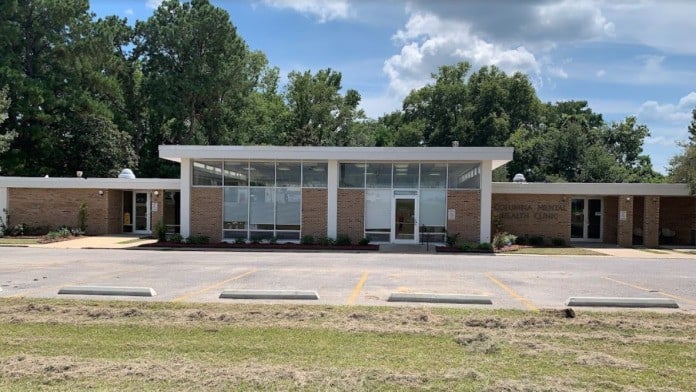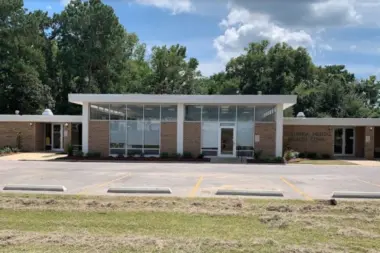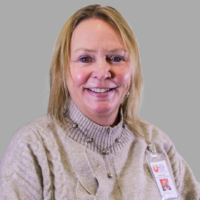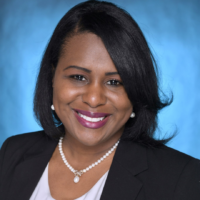About Northeast Delta Human Services Authority
Northeast Delta Human Services Authority’s Columbia Behavioral Health Clinic provides services for people across their lifespan, from children to seniors in Columbia, Louisiana. Columbia is a small town on the Ouachita River that’s known for its rich logging history and outdoor recreation. It offers a peaceful escape with a close-knit community and natural beauty.
Treatment Includes the Family Unit
They provide services for children and adolescents and they can work closely with the criminal justice system. They also provide parenting education programs and gender specific intensive outpatient treatment for substance abuse for women with young children. The adult addictive disorder services program starts with a formal assessment in which their counselors and clinicians use a series of physical and behavioral diagnostic criteria to determine if you have a substance use disorder. From there, they’ll put together a customized treatment plan for you and your needs.
Once the counselors have identified an addictive disorder, your assessment determines the level and the type of care you receive. They recognize that addiction happens within a family unit and offer family services to support you and the family unit through your recovery journey.
A Well Rounded Addiction Treatment Program in Louisiana
Your addiction treatment may include intensive or traditional outpatient treatment with individual mental health counseling if you have a co-occurring mental health condition. They work with the court system to provide court mandated classes and substance abuse education to help you understand more about addiction, which in turn supports your sobriety.
They partner with a gambling addiction service provider to ensure that each of your addictions is addressed appropriately. Your program may include individual and group counseling sessions using evidence-based therapies like motivational interviewing, cognitive behavioral therapy, or rational living therapy.
Your program typically includes a research based curriculum too to help you address lifestyle choices that you might have neglected during your addiction. These choices can help improve your overall health and thus your physical and mental resilience which is crucial in a relapse prevention program.
Community Opioid Misuse and Abuse Prevention
The opioid misuse and abuse prevention program is a community-based program that helps to provide access to medication assisted treatment, outreach community programs, and programs to reduce recidivism. They use an integrated service network of community programs that include peer support services, prescription take back boxes, and Narcan training and distribution.
They accept most private insurance plans, Medicare, Medicaid, Benefit Management, and CHAMPVA. If you are uninsured or underinsured, they encourage you to call and will offer sliding scale fees when you meet eligibility requirements.
Latest Reviews
Rehab Score
Gallery


Accepted Insurance
Other Forms of Payment
Medicaid is a state based program that helps lower-income individuals and families pay for healthcare. Medicaid covers addiction treatment so those enrolled can use their coverage to pay for rehab. When a program accepts Medicaid the client often pays very little or nothing out of their own pocket.
Private insurance refers to any kind of healthcare coverage that isn't from the state or federal government. This includes individual and family plans offered by an employer or purchased from the Insurance Marketplace. Every plan will have different requirements and out of pocket costs so be sure to get the full details before you start treatment.
Self-pay involves paying for treatment out of your own pocket. You can use savings or credit, get a personal loan, or receive help from family and friends to fund your treatment. If you don't have insurance or your insurance plan doesn't cover a specific program, self-pay can help ensure you still get the care you need.
Financial aid can take many forms. Centers may have grants or scholarships available to clients who meet eligibility requirements. Programs that receive SAMHSA grants may have financial aid available for those who need treatment as well. Grants and scholarships can help you pai for treatment without having to repay.
Medicare is a federal program that provides health insurance for those 65 and older. It also serves people under 65 with chronic and disabling health challenges. To use Medicare for addiction treatment you need to find a program that accepts Medicare and is in network with your plan. Out of pocket costs and preauthorization requirements vary, so always check with your provider.
Sliding scale payments are based on a client's income and family size. The goal is to make treatment affordable to everyone. By taking these factors into account, addiction recovery care providers help ensure that your treatment does not become a financial burden to you or your family, eliminating one barrier to care.
Addiction Treatments
Levels of Care
Outpatient Programs (OP) are for those seeking mental rehab or drug rehab, but who also stay at home every night. The main difference between outpatient treatment (OP) and intensive outpatient treatment (IOP) lies in the amount of hours the patient spends at the facility. Most of the time an outpatient program is designed for someone who has completed an inpatient stay and is looking to continue their growth in recovery. Outpatient is not meant to be the starting point, it is commonly referred to as aftercare.
Intensive Outpatient programs are for those who want or need a very structured treatment program but who also wish to live at home and continue with certain responsibilities (such as work or school). IOP substance abuse treatment programs vary in duration and intensity, and certain outpatient rehab centers will offer individualized treatment programs. The Intensive Outpatient Program provides addictive disorder treatment for nine hours per week in a group setting for six weeks. Individuals who are relatively stable on medication and require minimal interventions may receive medication management, educational services and referral services.
Completing a drug or alcohol rehab program shouldn’t spell the end of substance abuse treatment. Aftercare involves making a sustainable plan for recovery, including ongoing support. This can include sober living arrangements like halfway houses, career counseling, and setting a patient up with community programs like Alcoholics Anonymous (AA) or Narcotics Anonymous (NA). The Aftercare Program provides one hour counseling per week for an indefinite period of time.
Treatments
The goal of treatment for alcoholism is abstinence. Those with poor social support, poor motivation, or psychiatric disorders tend to relapse within a few years of treatment. For these people, success is measured by longer periods of abstinence, reduced use of alcohol, better health, and improved social functioning. Recovery and Maintenance are usually based on 12 step programs and AA meetings.
While each drug rehab in Louisiana offers unique elements, recovery support often follows a similar pattern. Detox is followed by inpatient and/or outpatient care, then aftercare support is provided once the participant completes the initial program.
A combined mental health and substance abuse rehab has the staff and resources available to handle individuals with both mental health and substance abuse issues. It can be challenging to determine where a specific symptom stems from (a mental health issue or an issue related to substance abuse), so mental health and substance abuse professionals are helpful in detangling symptoms and keeping treatment on track.
Programs
Adult rehab programs include therapies tailored to each client's specific needs, goals, and recovery progress. They are tailored to the specific challenges adult clients may face, including family and work pressures and commitments. From inpatient and residential treatment to various levels of outpatient services, there are many options available. Some facilities also help adults work through co-occurring conditions, like anxiety, that can accompany addiction.
Young adulthood can be an exciting, yet difficult, time of transition. Individuals in their late teens to mid-20s face unique stressors related to school, jobs, families, and social circles, which can lead to a rise in substance use. Rehab centers with dedicated young adult programs will include activities and amenities that cater to this age group, with an emphasis on specialized counseling, peer socialization, and ongoing aftercare.
Clinical Services
Cognitive Behavioral Therapy (CBT) is a therapy modality that focuses on the relationship between one's thoughts, feelings, and behaviors. It is used to establish and allow for healthy responses to thoughts and feelings (instead of unhealthy responses, like using drugs or alcohol). CBT has been proven effective for recovering addicts of all kinds, and is used to strengthen a patient's own self-awareness and ability to self-regulate. CBT allows individuals to monitor their own emotional state, become more adept at communicating with others, and manage stress without needing to engage in substance abuse.
Group therapy is any therapeutic work that happens in a group (not one-on-one). There are a number of different group therapy modalities, including support groups, experiential therapy, psycho-education, and more. Group therapy involves treatment as well as processing interaction between group members.
In individual therapy, a patient meets one-on-one with a trained psychologist or counselor. Therapy is a pivotal part of effective substance abuse treatment, as it often covers root causes of addiction, including challenges faced by the patient in their social, family, and work/school life.
Motivational Interviewing (MI) is a clinical approach to helping people with substance abuse issues and other conditions shift behavior in positive ways. It is more goal-oriented than traditional psychotherapy, as MI counselors directly attempt to get clients to consider making behavioral change (rather than wait for them to come to conclusions themselves). Its primary purpose is to resolve ambivalence and help clients become able to make healthy choices freely.
Staff & Accreditations
Staff

Dr. Monteic A. Sizer
Executive Director

Karen Evans
CFO & COO

Janice Rogers
Director of Integrated Care

Dr. Avius Carroll
Prevention & Wellness Services Director

Jimmy Powell
Developmental Disabilities Director

Tina Hill Conley
Human Resources Director
Accreditations

The Commission on Accreditation of Rehabilitation Facilities (CARF) is a non-profit organization that specifically accredits rehab organizations. Founded in 1966, CARF's, mission is to help service providers like rehab facilities maintain high standards of care.
CARF Accreditation: Yes
Contact Information
5159 Highway 4 East
Columbia, LA 71418




